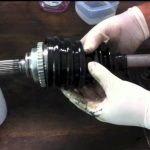
Without the wheel bearing to support the weight of the car and allow the tire to rotate when driving, it will be impossible for the car to move.
According to design, the wheel bearing should last the lifetime of a car but with use and miles traveled per time, there may be a need to replace the wheel bearing on a car.
When a wheel bearing is bad, there will be signs pointing in that direction. Since a bad wheel bearing can cause some problems in the car, the question now is, can a bad wheel bearing cause transmission problems?
Yes, a bad wheel bearing can cause transmission problems by putting too much stress on the transmission.
Can a Bad Wheel Bearing Cause Transmission Problems?
Yes, a bad wheel bearing can cause transmission problems although this depends on whether the car has front or rear-wheel drive.
If the car has front-wheel drive, the possibility of a bad wheel causing transmission problems is high because the shaft sits through the wheel bearing. On the other hand, if the car has a rear wheel drive the chances are less.
Irrespective of the wheel drive a car uses, once it has been noticed that the wheel bearing is bad, immediate actions should be taken in order to prevent more issues from occurring.
Symptoms of a Bad Wheel Bearing
Here are the symptoms of a bad wheel bearing:
1. Grinding or Grating Noise from the Wheels
This can be said to be the first and most identifiable symptom of a bad wheel bearing. When the wheel bearing is bad there will be a usual noise (grinding) coming from the wheel or tire.
To be sure if the noise is a result of bad wheel bearing, take note if it increases as the car accelerates. A bad wheel bearing will make so much noise when a car is accelerated.
2. The Car with a Mind of its Own
Another symptom of a bad wheel bearing is when the car no longer goes the way you want it to.
A car with bad wheel bearings may have a mind of its own, veering in a direction you do not want to go and of course, getting the car on track may prove quite difficult.
This symptom may however not necessarily be a result of bad wheel bearing but the possibility cannot be ruled out.
3. Car Feeling Loose when Driving
A symptom of bad wheel bearing could also be a feeling that the car is loose when driving. Bad wheel bearings can be felt when driving, it will be as if you do not have a firm grip on the car, and the car feels loose more like you can no longer control the car.
What Can Happen if you Keep Driving with a Bad Wheel Bearing?
Driving with a bad wheel bearing is definitely not advisable due to the danger of doing so. Here are some of the things that may likely happen if you keep driving with a bad wheel bearing.
- Wheels Can Come Off: The wheel bearing is an important part of the wheel as it carries the weight of the vehicle and allows the tire to rotate as it should. With the bearing bad, it becomes hard for the wheel to spin. The wheel coming off is an extreme situation that may happen if the bearing becomes very hot to the extent the axle becomes red.
- Losing Control of the Car: When the wheel spins to the point where it can no longer maintain its axis, driving becomes difficult and you may end up losing control of the car especially if you are driving at a high speed and beyond the speed limit.
- Brake Problem: Driving with bad wheel bearings can also cause brake problems such as the brake rotor wobbling. You do not want to deal with a wobbling brake rotor as it makes it difficult to stop a vehicle in the long run.
Should I Replace Both Wheel Bearings at the Same Time?
You do not have to replace both wheel bearings at the same time except of course they are both bad.
The only circumstance under which you may want to consider replacing both at the same time is if you realize both wheel bearings have gone bad or you just want to replace both in order to prevent coming back for a replacement of the other one when it goes bad.
Other than this, replacing a wheel bearing when nothing is wrong with it is an absolute waste of money.
What is the Average Price to Replace a Wheel Bearing?
The price of replacing a wheel bearing largely depends on the type of car you use. Generally, the average cost of replacing a front wheel bearing is between $350 to $450 and $150 to $300 for the labor and parts costs respectively.
The average cost of replacing the rear wheel bearing however is between $190 to $310 and $225 to $350 labor and parts costs respectively.
How Many Hours Does It Take to Replace when Replacing a Wheel Bearing?
The length of time it takes to replace a wheel bearing depends on whether it is the rear or front wheel bearing that is being replaced.
To replace the front wheel bearing, an average of 90mins is expected while replacing the rear wheel bearing will take an hour.
Which Wheel Bearing Wear Out First?
The wheel bearing on the passenger side is usually the first one to wear out this is because they are the most exposed to standing gutter water.
In the event that the bearing on the driver’s side wears out first, then you should check that of the passenger side, it won’t be far behind.
How Does a Technician Check for a Loose Wheel Bearing?
To know if a wheel bearing is loose, the technician will first have to grasp the top and bottom of the wheel in an attempt to rock it.
While slightly rocking the wheel, there should be movement if the bearing is loose and will need replacement as soon as possible.
An alternative method to check for loose wheel bearings is to rotate the wheel by hand. If the wheel bearing is loose, worn out, or damaged there will be a roughness or noise. You may need to check that other wheel bearings are in good condition in the event that one is worn out.
Conclusion
A bad wheel bearing shouldn’t be taken lightly. If you are in doubt whether the problem is with the wheel bearing, have a mechanic check it out as they are in the best position to tell what the problem is.









